HI5015: Analysis of Samsung's Legal and Trade in Australia
VerifiedAdded on 2022/12/26
|10
|2676
|29
Report
AI Summary
This report provides an in-depth analysis of the legal and trade environment affecting Samsung's operations in Australia. It examines the legislative regulatory framework, including the Competition and Consumer Act 2010, taxation laws, the Fair Trading Act 1992, and employment laws, highlighting their impact on Samsung's business practices. Furthermore, the report explores the influence of various treaties, conventions, and agreements, such as the Korea-Australia Free Trade Agreement (KAFTA), the 1982 Australia-Korea Tax treaty, the China-Australia Free Trade Agreement (ChAFTA), and the ASEAN-Australia-New Zealand FTA (AANZFTA), on Samsung's products and services in the Australian market. The report emphasizes the importance of these factors for Samsung's international trade and its ability to navigate the complexities of the Australian market and global trade.
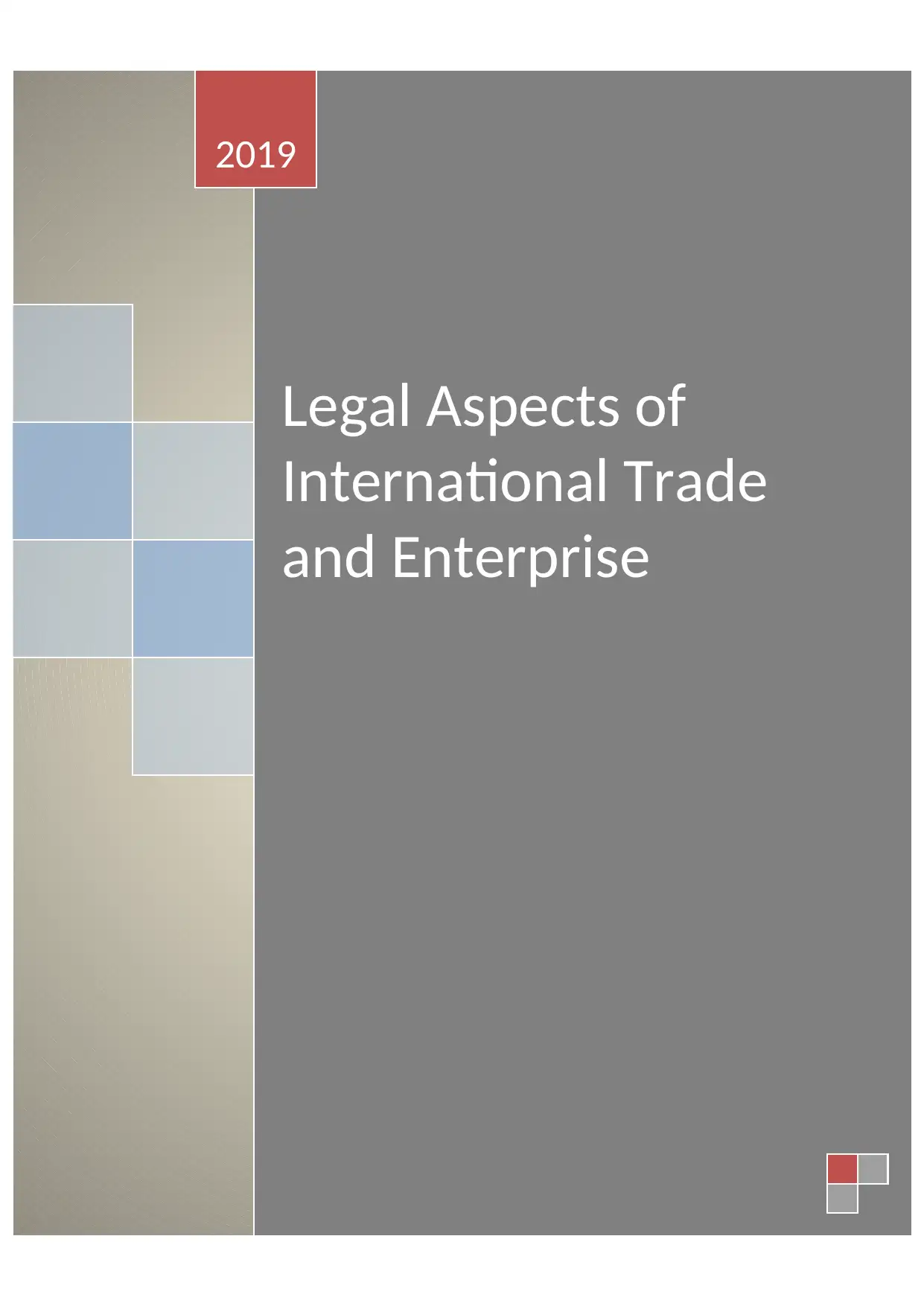
Legal Aspects of
International Trade
and Enterprise
2019
International Trade
and Enterprise
2019
Paraphrase This Document
Need a fresh take? Get an instant paraphrase of this document with our AI Paraphraser
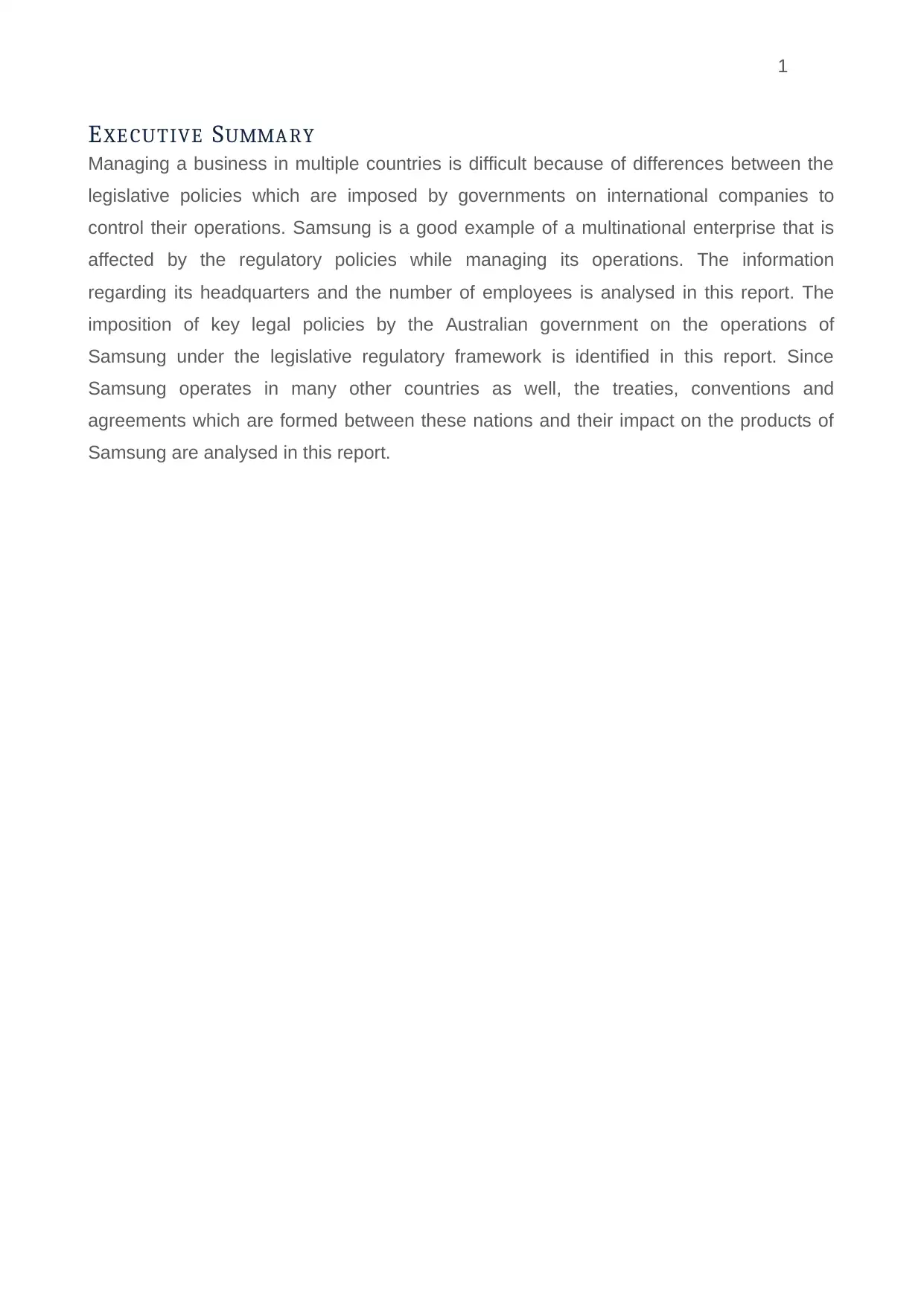
1
EXECUTIVE SUMMARY
Managing a business in multiple countries is difficult because of differences between the
legislative policies which are imposed by governments on international companies to
control their operations. Samsung is a good example of a multinational enterprise that is
affected by the regulatory policies while managing its operations. The information
regarding its headquarters and the number of employees is analysed in this report. The
imposition of key legal policies by the Australian government on the operations of
Samsung under the legislative regulatory framework is identified in this report. Since
Samsung operates in many other countries as well, the treaties, conventions and
agreements which are formed between these nations and their impact on the products of
Samsung are analysed in this report.
EXECUTIVE SUMMARY
Managing a business in multiple countries is difficult because of differences between the
legislative policies which are imposed by governments on international companies to
control their operations. Samsung is a good example of a multinational enterprise that is
affected by the regulatory policies while managing its operations. The information
regarding its headquarters and the number of employees is analysed in this report. The
imposition of key legal policies by the Australian government on the operations of
Samsung under the legislative regulatory framework is identified in this report. Since
Samsung operates in many other countries as well, the treaties, conventions and
agreements which are formed between these nations and their impact on the products of
Samsung are analysed in this report.
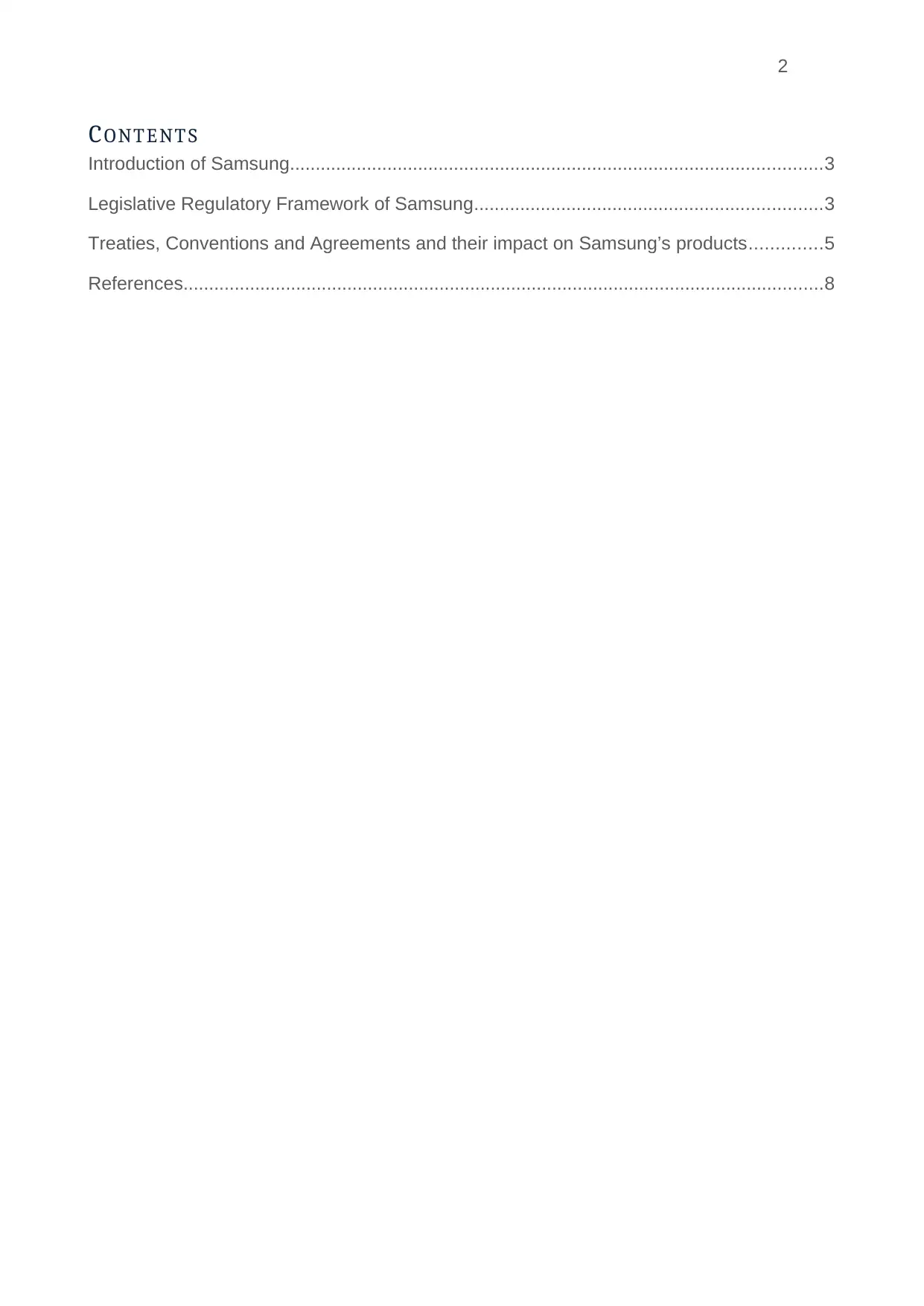
2
CONTENTS
Introduction of Samsung........................................................................................................3
Legislative Regulatory Framework of Samsung....................................................................3
Treaties, Conventions and Agreements and their impact on Samsung’s products..............5
References.............................................................................................................................8
CONTENTS
Introduction of Samsung........................................................................................................3
Legislative Regulatory Framework of Samsung....................................................................3
Treaties, Conventions and Agreements and their impact on Samsung’s products..............5
References.............................................................................................................................8
⊘ This is a preview!⊘
Do you want full access?
Subscribe today to unlock all pages.

Trusted by 1+ million students worldwide
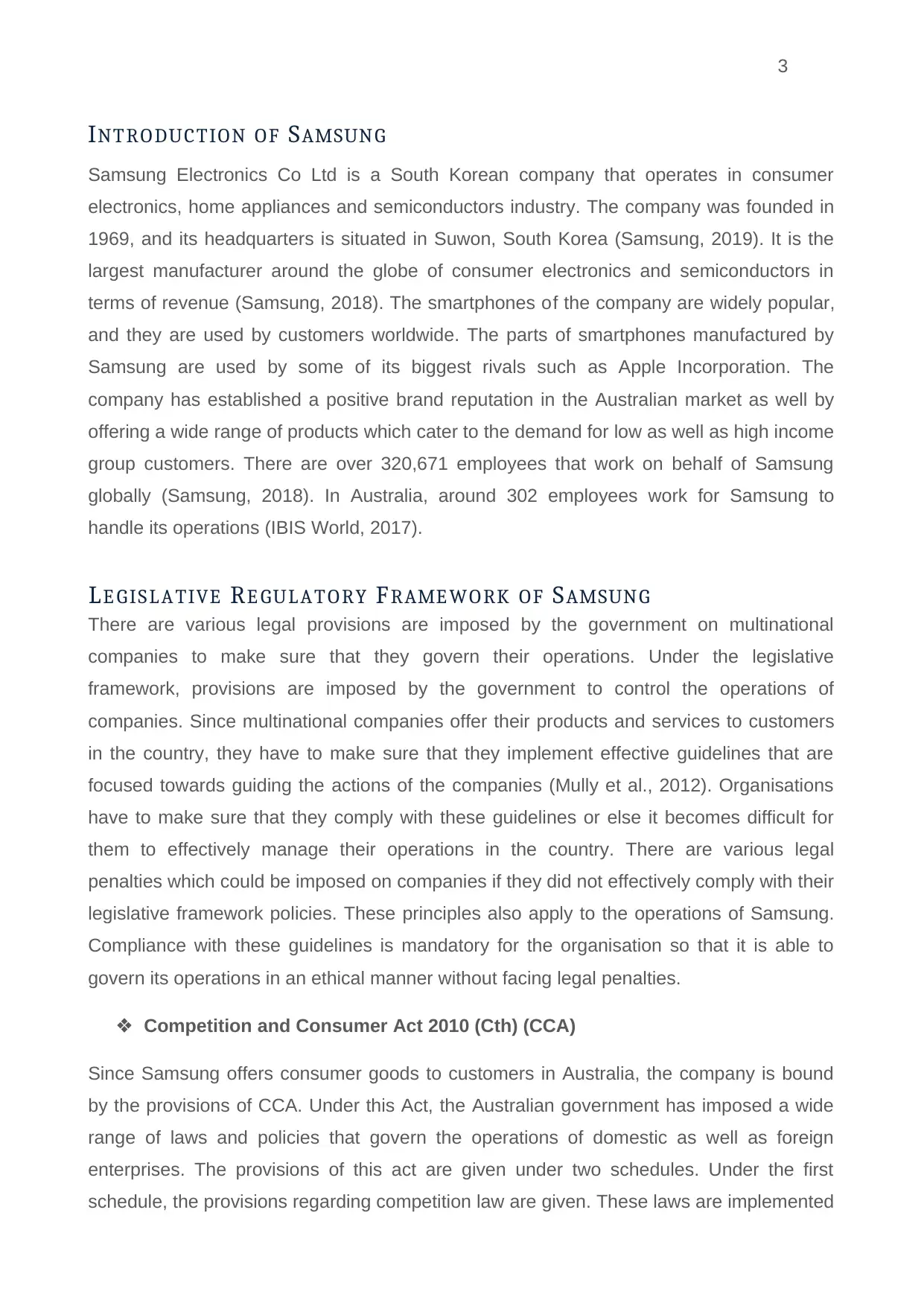
3
INTRODUCTION OF SAMSUNG
Samsung Electronics Co Ltd is a South Korean company that operates in consumer
electronics, home appliances and semiconductors industry. The company was founded in
1969, and its headquarters is situated in Suwon, South Korea (Samsung, 2019). It is the
largest manufacturer around the globe of consumer electronics and semiconductors in
terms of revenue (Samsung, 2018). The smartphones of the company are widely popular,
and they are used by customers worldwide. The parts of smartphones manufactured by
Samsung are used by some of its biggest rivals such as Apple Incorporation. The
company has established a positive brand reputation in the Australian market as well by
offering a wide range of products which cater to the demand for low as well as high income
group customers. There are over 320,671 employees that work on behalf of Samsung
globally (Samsung, 2018). In Australia, around 302 employees work for Samsung to
handle its operations (IBIS World, 2017).
LEGISLATIVE REGULATORY FRAMEWORK OF SAMSUNG
There are various legal provisions are imposed by the government on multinational
companies to make sure that they govern their operations. Under the legislative
framework, provisions are imposed by the government to control the operations of
companies. Since multinational companies offer their products and services to customers
in the country, they have to make sure that they implement effective guidelines that are
focused towards guiding the actions of the companies (Mully et al., 2012). Organisations
have to make sure that they comply with these guidelines or else it becomes difficult for
them to effectively manage their operations in the country. There are various legal
penalties which could be imposed on companies if they did not effectively comply with their
legislative framework policies. These principles also apply to the operations of Samsung.
Compliance with these guidelines is mandatory for the organisation so that it is able to
govern its operations in an ethical manner without facing legal penalties.
Competition and Consumer Act 2010 (Cth) (CCA)
Since Samsung offers consumer goods to customers in Australia, the company is bound
by the provisions of CCA. Under this Act, the Australian government has imposed a wide
range of laws and policies that govern the operations of domestic as well as foreign
enterprises. The provisions of this act are given under two schedules. Under the first
schedule, the provisions regarding competition law are given. These laws are implemented
INTRODUCTION OF SAMSUNG
Samsung Electronics Co Ltd is a South Korean company that operates in consumer
electronics, home appliances and semiconductors industry. The company was founded in
1969, and its headquarters is situated in Suwon, South Korea (Samsung, 2019). It is the
largest manufacturer around the globe of consumer electronics and semiconductors in
terms of revenue (Samsung, 2018). The smartphones of the company are widely popular,
and they are used by customers worldwide. The parts of smartphones manufactured by
Samsung are used by some of its biggest rivals such as Apple Incorporation. The
company has established a positive brand reputation in the Australian market as well by
offering a wide range of products which cater to the demand for low as well as high income
group customers. There are over 320,671 employees that work on behalf of Samsung
globally (Samsung, 2018). In Australia, around 302 employees work for Samsung to
handle its operations (IBIS World, 2017).
LEGISLATIVE REGULATORY FRAMEWORK OF SAMSUNG
There are various legal provisions are imposed by the government on multinational
companies to make sure that they govern their operations. Under the legislative
framework, provisions are imposed by the government to control the operations of
companies. Since multinational companies offer their products and services to customers
in the country, they have to make sure that they implement effective guidelines that are
focused towards guiding the actions of the companies (Mully et al., 2012). Organisations
have to make sure that they comply with these guidelines or else it becomes difficult for
them to effectively manage their operations in the country. There are various legal
penalties which could be imposed on companies if they did not effectively comply with their
legislative framework policies. These principles also apply to the operations of Samsung.
Compliance with these guidelines is mandatory for the organisation so that it is able to
govern its operations in an ethical manner without facing legal penalties.
Competition and Consumer Act 2010 (Cth) (CCA)
Since Samsung offers consumer goods to customers in Australia, the company is bound
by the provisions of CCA. Under this Act, the Australian government has imposed a wide
range of laws and policies that govern the operations of domestic as well as foreign
enterprises. The provisions of this act are given under two schedules. Under the first
schedule, the provisions regarding competition law are given. These laws are implemented
Paraphrase This Document
Need a fresh take? Get an instant paraphrase of this document with our AI Paraphraser
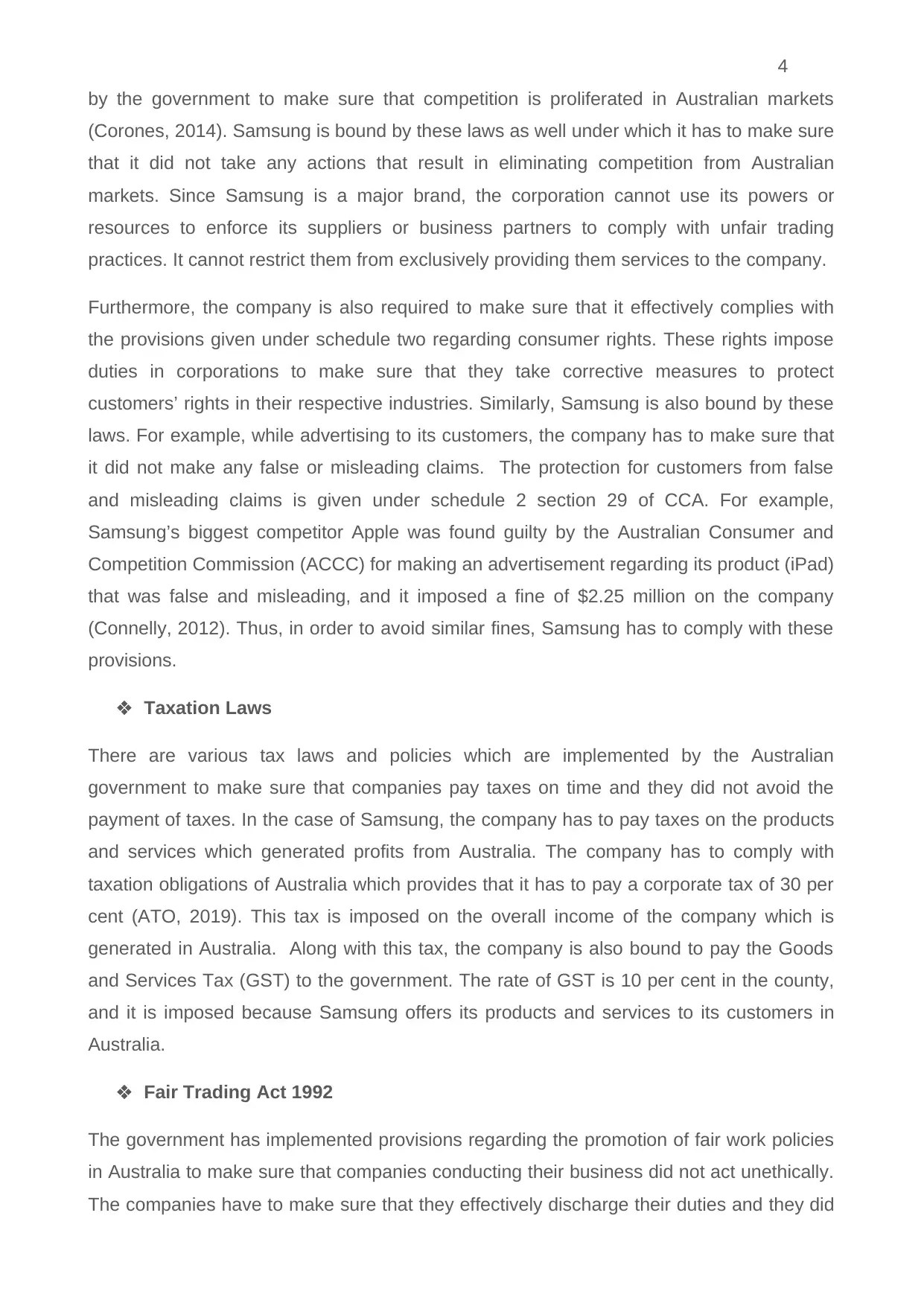
4
by the government to make sure that competition is proliferated in Australian markets
(Corones, 2014). Samsung is bound by these laws as well under which it has to make sure
that it did not take any actions that result in eliminating competition from Australian
markets. Since Samsung is a major brand, the corporation cannot use its powers or
resources to enforce its suppliers or business partners to comply with unfair trading
practices. It cannot restrict them from exclusively providing them services to the company.
Furthermore, the company is also required to make sure that it effectively complies with
the provisions given under schedule two regarding consumer rights. These rights impose
duties in corporations to make sure that they take corrective measures to protect
customers’ rights in their respective industries. Similarly, Samsung is also bound by these
laws. For example, while advertising to its customers, the company has to make sure that
it did not make any false or misleading claims. The protection for customers from false
and misleading claims is given under schedule 2 section 29 of CCA. For example,
Samsung’s biggest competitor Apple was found guilty by the Australian Consumer and
Competition Commission (ACCC) for making an advertisement regarding its product (iPad)
that was false and misleading, and it imposed a fine of $2.25 million on the company
(Connelly, 2012). Thus, in order to avoid similar fines, Samsung has to comply with these
provisions.
Taxation Laws
There are various tax laws and policies which are implemented by the Australian
government to make sure that companies pay taxes on time and they did not avoid the
payment of taxes. In the case of Samsung, the company has to pay taxes on the products
and services which generated profits from Australia. The company has to comply with
taxation obligations of Australia which provides that it has to pay a corporate tax of 30 per
cent (ATO, 2019). This tax is imposed on the overall income of the company which is
generated in Australia. Along with this tax, the company is also bound to pay the Goods
and Services Tax (GST) to the government. The rate of GST is 10 per cent in the county,
and it is imposed because Samsung offers its products and services to its customers in
Australia.
Fair Trading Act 1992
The government has implemented provisions regarding the promotion of fair work policies
in Australia to make sure that companies conducting their business did not act unethically.
The companies have to make sure that they effectively discharge their duties and they did
by the government to make sure that competition is proliferated in Australian markets
(Corones, 2014). Samsung is bound by these laws as well under which it has to make sure
that it did not take any actions that result in eliminating competition from Australian
markets. Since Samsung is a major brand, the corporation cannot use its powers or
resources to enforce its suppliers or business partners to comply with unfair trading
practices. It cannot restrict them from exclusively providing them services to the company.
Furthermore, the company is also required to make sure that it effectively complies with
the provisions given under schedule two regarding consumer rights. These rights impose
duties in corporations to make sure that they take corrective measures to protect
customers’ rights in their respective industries. Similarly, Samsung is also bound by these
laws. For example, while advertising to its customers, the company has to make sure that
it did not make any false or misleading claims. The protection for customers from false
and misleading claims is given under schedule 2 section 29 of CCA. For example,
Samsung’s biggest competitor Apple was found guilty by the Australian Consumer and
Competition Commission (ACCC) for making an advertisement regarding its product (iPad)
that was false and misleading, and it imposed a fine of $2.25 million on the company
(Connelly, 2012). Thus, in order to avoid similar fines, Samsung has to comply with these
provisions.
Taxation Laws
There are various tax laws and policies which are implemented by the Australian
government to make sure that companies pay taxes on time and they did not avoid the
payment of taxes. In the case of Samsung, the company has to pay taxes on the products
and services which generated profits from Australia. The company has to comply with
taxation obligations of Australia which provides that it has to pay a corporate tax of 30 per
cent (ATO, 2019). This tax is imposed on the overall income of the company which is
generated in Australia. Along with this tax, the company is also bound to pay the Goods
and Services Tax (GST) to the government. The rate of GST is 10 per cent in the county,
and it is imposed because Samsung offers its products and services to its customers in
Australia.
Fair Trading Act 1992
The government has implemented provisions regarding the promotion of fair work policies
in Australia to make sure that companies conducting their business did not act unethically.
The companies have to make sure that they effectively discharge their duties and they did
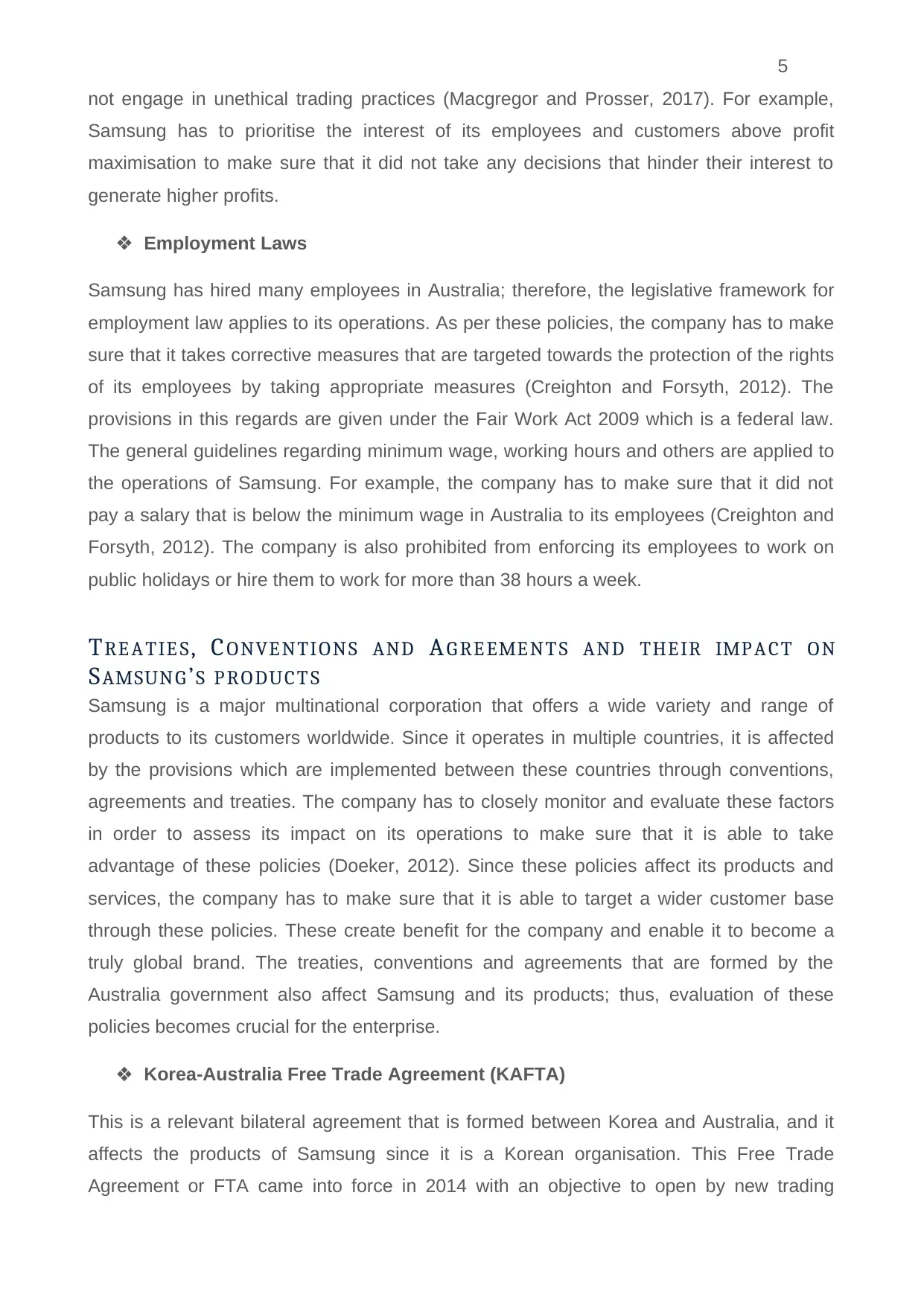
5
not engage in unethical trading practices (Macgregor and Prosser, 2017). For example,
Samsung has to prioritise the interest of its employees and customers above profit
maximisation to make sure that it did not take any decisions that hinder their interest to
generate higher profits.
Employment Laws
Samsung has hired many employees in Australia; therefore, the legislative framework for
employment law applies to its operations. As per these policies, the company has to make
sure that it takes corrective measures that are targeted towards the protection of the rights
of its employees by taking appropriate measures (Creighton and Forsyth, 2012). The
provisions in this regards are given under the Fair Work Act 2009 which is a federal law.
The general guidelines regarding minimum wage, working hours and others are applied to
the operations of Samsung. For example, the company has to make sure that it did not
pay a salary that is below the minimum wage in Australia to its employees (Creighton and
Forsyth, 2012). The company is also prohibited from enforcing its employees to work on
public holidays or hire them to work for more than 38 hours a week.
TREATIES, CONVENTIONS AND AGREEMENTS AND THEIR IMPACT ON
SAMSUNG’S PRODUCTS
Samsung is a major multinational corporation that offers a wide variety and range of
products to its customers worldwide. Since it operates in multiple countries, it is affected
by the provisions which are implemented between these countries through conventions,
agreements and treaties. The company has to closely monitor and evaluate these factors
in order to assess its impact on its operations to make sure that it is able to take
advantage of these policies (Doeker, 2012). Since these policies affect its products and
services, the company has to make sure that it is able to target a wider customer base
through these policies. These create benefit for the company and enable it to become a
truly global brand. The treaties, conventions and agreements that are formed by the
Australia government also affect Samsung and its products; thus, evaluation of these
policies becomes crucial for the enterprise.
Korea-Australia Free Trade Agreement (KAFTA)
This is a relevant bilateral agreement that is formed between Korea and Australia, and it
affects the products of Samsung since it is a Korean organisation. This Free Trade
Agreement or FTA came into force in 2014 with an objective to open by new trading
not engage in unethical trading practices (Macgregor and Prosser, 2017). For example,
Samsung has to prioritise the interest of its employees and customers above profit
maximisation to make sure that it did not take any decisions that hinder their interest to
generate higher profits.
Employment Laws
Samsung has hired many employees in Australia; therefore, the legislative framework for
employment law applies to its operations. As per these policies, the company has to make
sure that it takes corrective measures that are targeted towards the protection of the rights
of its employees by taking appropriate measures (Creighton and Forsyth, 2012). The
provisions in this regards are given under the Fair Work Act 2009 which is a federal law.
The general guidelines regarding minimum wage, working hours and others are applied to
the operations of Samsung. For example, the company has to make sure that it did not
pay a salary that is below the minimum wage in Australia to its employees (Creighton and
Forsyth, 2012). The company is also prohibited from enforcing its employees to work on
public holidays or hire them to work for more than 38 hours a week.
TREATIES, CONVENTIONS AND AGREEMENTS AND THEIR IMPACT ON
SAMSUNG’S PRODUCTS
Samsung is a major multinational corporation that offers a wide variety and range of
products to its customers worldwide. Since it operates in multiple countries, it is affected
by the provisions which are implemented between these countries through conventions,
agreements and treaties. The company has to closely monitor and evaluate these factors
in order to assess its impact on its operations to make sure that it is able to take
advantage of these policies (Doeker, 2012). Since these policies affect its products and
services, the company has to make sure that it is able to target a wider customer base
through these policies. These create benefit for the company and enable it to become a
truly global brand. The treaties, conventions and agreements that are formed by the
Australia government also affect Samsung and its products; thus, evaluation of these
policies becomes crucial for the enterprise.
Korea-Australia Free Trade Agreement (KAFTA)
This is a relevant bilateral agreement that is formed between Korea and Australia, and it
affects the products of Samsung since it is a Korean organisation. This Free Trade
Agreement or FTA came into force in 2014 with an objective to open by new trading
⊘ This is a preview!⊘
Do you want full access?
Subscribe today to unlock all pages.

Trusted by 1+ million students worldwide
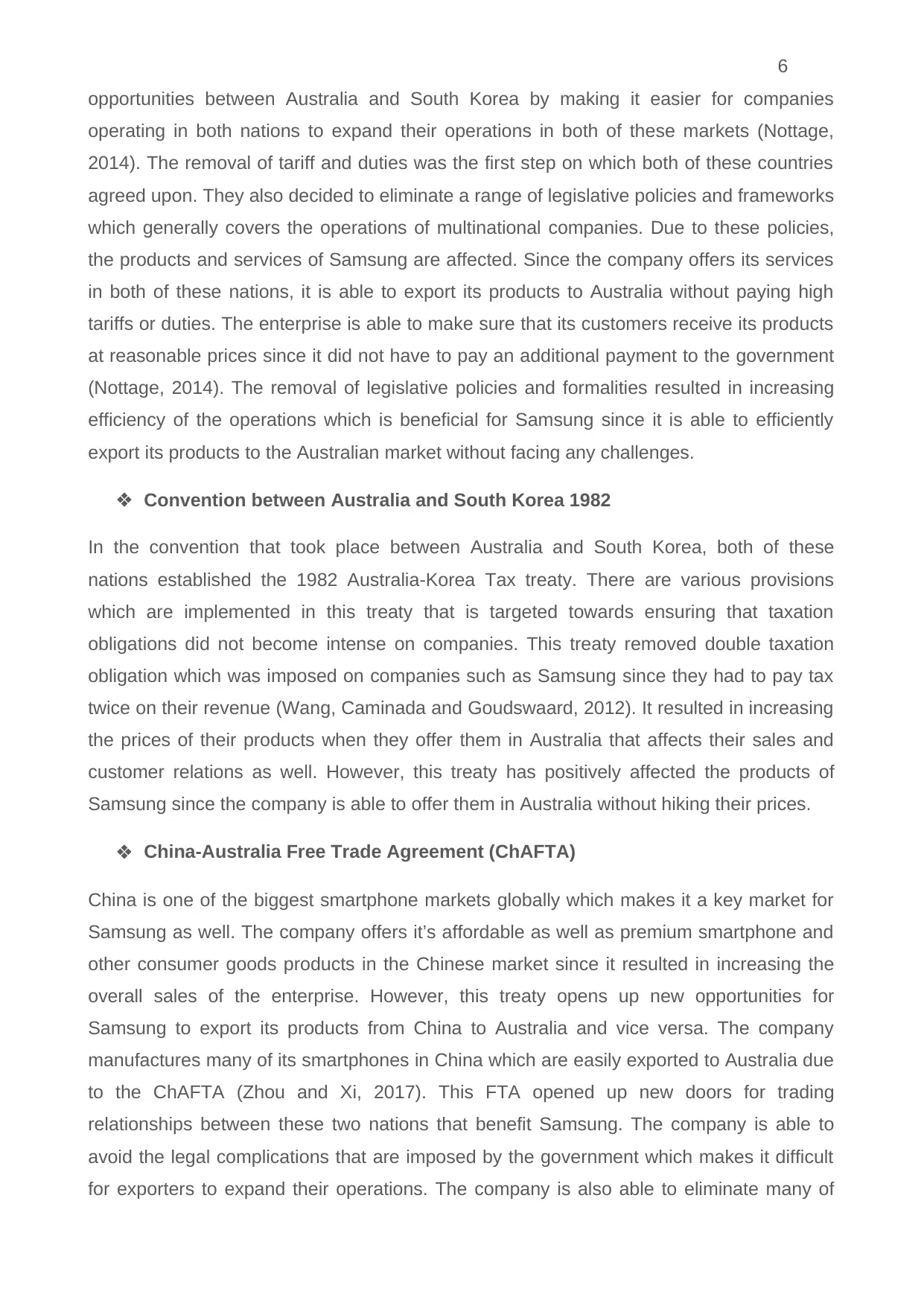
6
opportunities between Australia and South Korea by making it easier for companies
operating in both nations to expand their operations in both of these markets (Nottage,
2014). The removal of tariff and duties was the first step on which both of these countries
agreed upon. They also decided to eliminate a range of legislative policies and frameworks
which generally covers the operations of multinational companies. Due to these policies,
the products and services of Samsung are affected. Since the company offers its services
in both of these nations, it is able to export its products to Australia without paying high
tariffs or duties. The enterprise is able to make sure that its customers receive its products
at reasonable prices since it did not have to pay an additional payment to the government
(Nottage, 2014). The removal of legislative policies and formalities resulted in increasing
efficiency of the operations which is beneficial for Samsung since it is able to efficiently
export its products to the Australian market without facing any challenges.
Convention between Australia and South Korea 1982
In the convention that took place between Australia and South Korea, both of these
nations established the 1982 Australia-Korea Tax treaty. There are various provisions
which are implemented in this treaty that is targeted towards ensuring that taxation
obligations did not become intense on companies. This treaty removed double taxation
obligation which was imposed on companies such as Samsung since they had to pay tax
twice on their revenue (Wang, Caminada and Goudswaard, 2012). It resulted in increasing
the prices of their products when they offer them in Australia that affects their sales and
customer relations as well. However, this treaty has positively affected the products of
Samsung since the company is able to offer them in Australia without hiking their prices.
China-Australia Free Trade Agreement (ChAFTA)
China is one of the biggest smartphone markets globally which makes it a key market for
Samsung as well. The company offers it’s affordable as well as premium smartphone and
other consumer goods products in the Chinese market since it resulted in increasing the
overall sales of the enterprise. However, this treaty opens up new opportunities for
Samsung to export its products from China to Australia and vice versa. The company
manufactures many of its smartphones in China which are easily exported to Australia due
to the ChAFTA (Zhou and Xi, 2017). This FTA opened up new doors for trading
relationships between these two nations that benefit Samsung. The company is able to
avoid the legal complications that are imposed by the government which makes it difficult
for exporters to expand their operations. The company is also able to eliminate many of
opportunities between Australia and South Korea by making it easier for companies
operating in both nations to expand their operations in both of these markets (Nottage,
2014). The removal of tariff and duties was the first step on which both of these countries
agreed upon. They also decided to eliminate a range of legislative policies and frameworks
which generally covers the operations of multinational companies. Due to these policies,
the products and services of Samsung are affected. Since the company offers its services
in both of these nations, it is able to export its products to Australia without paying high
tariffs or duties. The enterprise is able to make sure that its customers receive its products
at reasonable prices since it did not have to pay an additional payment to the government
(Nottage, 2014). The removal of legislative policies and formalities resulted in increasing
efficiency of the operations which is beneficial for Samsung since it is able to efficiently
export its products to the Australian market without facing any challenges.
Convention between Australia and South Korea 1982
In the convention that took place between Australia and South Korea, both of these
nations established the 1982 Australia-Korea Tax treaty. There are various provisions
which are implemented in this treaty that is targeted towards ensuring that taxation
obligations did not become intense on companies. This treaty removed double taxation
obligation which was imposed on companies such as Samsung since they had to pay tax
twice on their revenue (Wang, Caminada and Goudswaard, 2012). It resulted in increasing
the prices of their products when they offer them in Australia that affects their sales and
customer relations as well. However, this treaty has positively affected the products of
Samsung since the company is able to offer them in Australia without hiking their prices.
China-Australia Free Trade Agreement (ChAFTA)
China is one of the biggest smartphone markets globally which makes it a key market for
Samsung as well. The company offers it’s affordable as well as premium smartphone and
other consumer goods products in the Chinese market since it resulted in increasing the
overall sales of the enterprise. However, this treaty opens up new opportunities for
Samsung to export its products from China to Australia and vice versa. The company
manufactures many of its smartphones in China which are easily exported to Australia due
to the ChAFTA (Zhou and Xi, 2017). This FTA opened up new doors for trading
relationships between these two nations that benefit Samsung. The company is able to
avoid the legal complications that are imposed by the government which makes it difficult
for exporters to expand their operations. The company is also able to eliminate many of
Paraphrase This Document
Need a fresh take? Get an instant paraphrase of this document with our AI Paraphraser
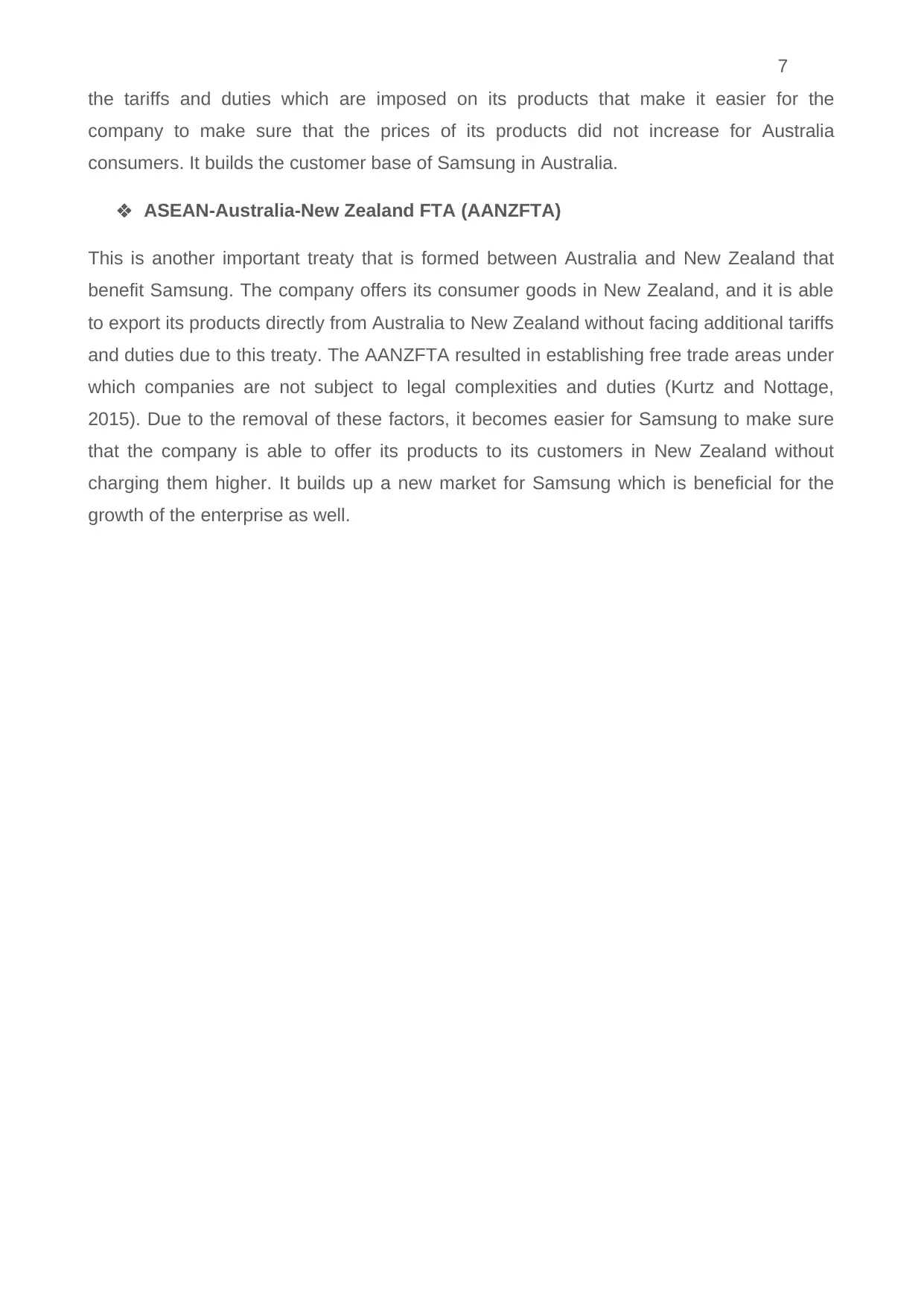
7
the tariffs and duties which are imposed on its products that make it easier for the
company to make sure that the prices of its products did not increase for Australia
consumers. It builds the customer base of Samsung in Australia.
ASEAN-Australia-New Zealand FTA (AANZFTA)
This is another important treaty that is formed between Australia and New Zealand that
benefit Samsung. The company offers its consumer goods in New Zealand, and it is able
to export its products directly from Australia to New Zealand without facing additional tariffs
and duties due to this treaty. The AANZFTA resulted in establishing free trade areas under
which companies are not subject to legal complexities and duties (Kurtz and Nottage,
2015). Due to the removal of these factors, it becomes easier for Samsung to make sure
that the company is able to offer its products to its customers in New Zealand without
charging them higher. It builds up a new market for Samsung which is beneficial for the
growth of the enterprise as well.
the tariffs and duties which are imposed on its products that make it easier for the
company to make sure that the prices of its products did not increase for Australia
consumers. It builds the customer base of Samsung in Australia.
ASEAN-Australia-New Zealand FTA (AANZFTA)
This is another important treaty that is formed between Australia and New Zealand that
benefit Samsung. The company offers its consumer goods in New Zealand, and it is able
to export its products directly from Australia to New Zealand without facing additional tariffs
and duties due to this treaty. The AANZFTA resulted in establishing free trade areas under
which companies are not subject to legal complexities and duties (Kurtz and Nottage,
2015). Due to the removal of these factors, it becomes easier for Samsung to make sure
that the company is able to offer its products to its customers in New Zealand without
charging them higher. It builds up a new market for Samsung which is beneficial for the
growth of the enterprise as well.
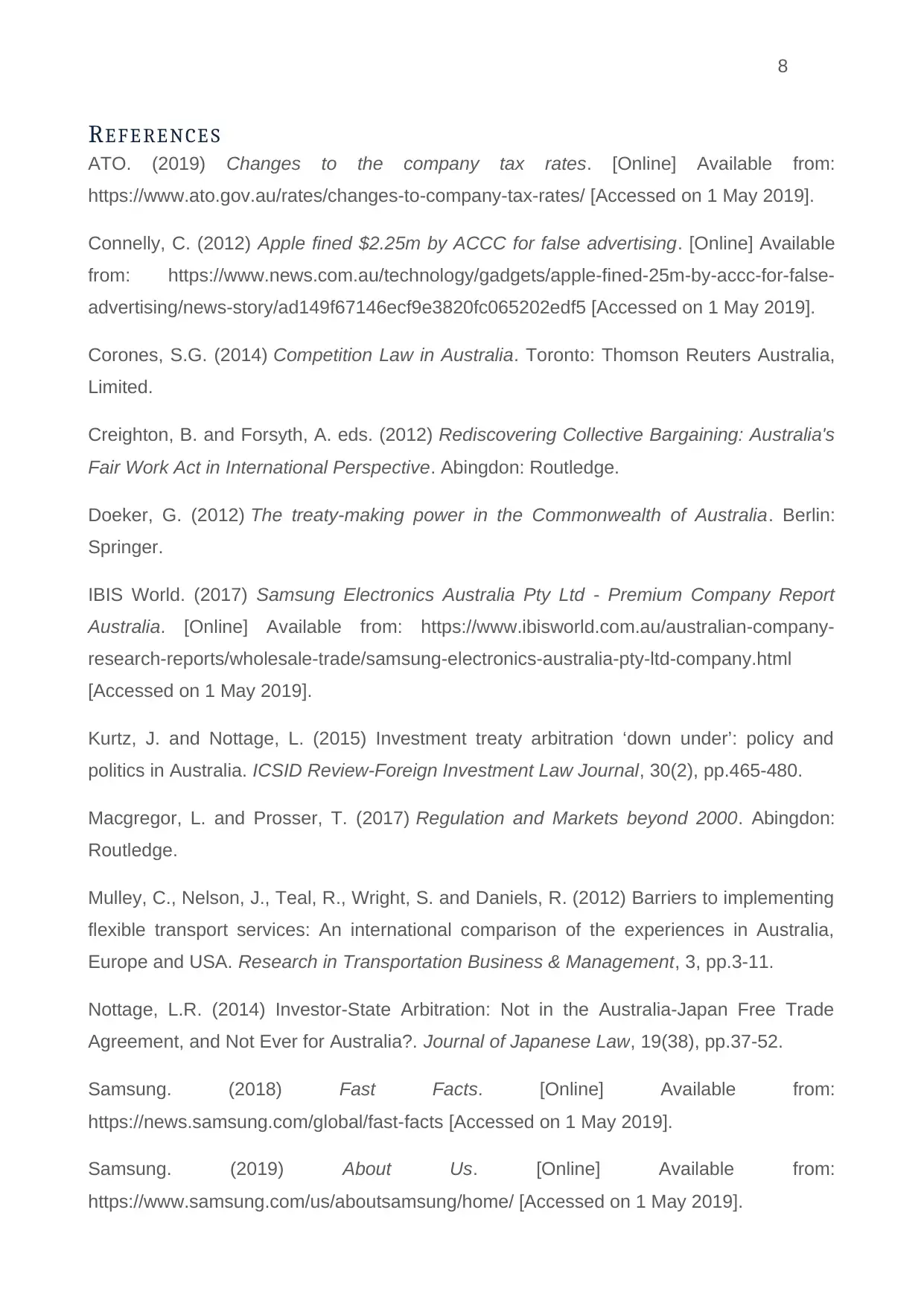
8
REFERENCES
ATO. (2019) Changes to the company tax rates. [Online] Available from:
https://www.ato.gov.au/rates/changes-to-company-tax-rates/ [Accessed on 1 May 2019].
Connelly, C. (2012) Apple fined $2.25m by ACCC for false advertising. [Online] Available
from: https://www.news.com.au/technology/gadgets/apple-fined-25m-by-accc-for-false-
advertising/news-story/ad149f67146ecf9e3820fc065202edf5 [Accessed on 1 May 2019].
Corones, S.G. (2014) Competition Law in Australia. Toronto: Thomson Reuters Australia,
Limited.
Creighton, B. and Forsyth, A. eds. (2012) Rediscovering Collective Bargaining: Australia's
Fair Work Act in International Perspective. Abingdon: Routledge.
Doeker, G. (2012) The treaty-making power in the Commonwealth of Australia. Berlin:
Springer.
IBIS World. (2017) Samsung Electronics Australia Pty Ltd - Premium Company Report
Australia. [Online] Available from: https://www.ibisworld.com.au/australian-company-
research-reports/wholesale-trade/samsung-electronics-australia-pty-ltd-company.html
[Accessed on 1 May 2019].
Kurtz, J. and Nottage, L. (2015) Investment treaty arbitration ‘down under’: policy and
politics in Australia. ICSID Review-Foreign Investment Law Journal, 30(2), pp.465-480.
Macgregor, L. and Prosser, T. (2017) Regulation and Markets beyond 2000. Abingdon:
Routledge.
Mulley, C., Nelson, J., Teal, R., Wright, S. and Daniels, R. (2012) Barriers to implementing
flexible transport services: An international comparison of the experiences in Australia,
Europe and USA. Research in Transportation Business & Management, 3, pp.3-11.
Nottage, L.R. (2014) Investor-State Arbitration: Not in the Australia-Japan Free Trade
Agreement, and Not Ever for Australia?. Journal of Japanese Law, 19(38), pp.37-52.
Samsung. (2018) Fast Facts. [Online] Available from:
https://news.samsung.com/global/fast-facts [Accessed on 1 May 2019].
Samsung. (2019) About Us. [Online] Available from:
https://www.samsung.com/us/aboutsamsung/home/ [Accessed on 1 May 2019].
REFERENCES
ATO. (2019) Changes to the company tax rates. [Online] Available from:
https://www.ato.gov.au/rates/changes-to-company-tax-rates/ [Accessed on 1 May 2019].
Connelly, C. (2012) Apple fined $2.25m by ACCC for false advertising. [Online] Available
from: https://www.news.com.au/technology/gadgets/apple-fined-25m-by-accc-for-false-
advertising/news-story/ad149f67146ecf9e3820fc065202edf5 [Accessed on 1 May 2019].
Corones, S.G. (2014) Competition Law in Australia. Toronto: Thomson Reuters Australia,
Limited.
Creighton, B. and Forsyth, A. eds. (2012) Rediscovering Collective Bargaining: Australia's
Fair Work Act in International Perspective. Abingdon: Routledge.
Doeker, G. (2012) The treaty-making power in the Commonwealth of Australia. Berlin:
Springer.
IBIS World. (2017) Samsung Electronics Australia Pty Ltd - Premium Company Report
Australia. [Online] Available from: https://www.ibisworld.com.au/australian-company-
research-reports/wholesale-trade/samsung-electronics-australia-pty-ltd-company.html
[Accessed on 1 May 2019].
Kurtz, J. and Nottage, L. (2015) Investment treaty arbitration ‘down under’: policy and
politics in Australia. ICSID Review-Foreign Investment Law Journal, 30(2), pp.465-480.
Macgregor, L. and Prosser, T. (2017) Regulation and Markets beyond 2000. Abingdon:
Routledge.
Mulley, C., Nelson, J., Teal, R., Wright, S. and Daniels, R. (2012) Barriers to implementing
flexible transport services: An international comparison of the experiences in Australia,
Europe and USA. Research in Transportation Business & Management, 3, pp.3-11.
Nottage, L.R. (2014) Investor-State Arbitration: Not in the Australia-Japan Free Trade
Agreement, and Not Ever for Australia?. Journal of Japanese Law, 19(38), pp.37-52.
Samsung. (2018) Fast Facts. [Online] Available from:
https://news.samsung.com/global/fast-facts [Accessed on 1 May 2019].
Samsung. (2019) About Us. [Online] Available from:
https://www.samsung.com/us/aboutsamsung/home/ [Accessed on 1 May 2019].
⊘ This is a preview!⊘
Do you want full access?
Subscribe today to unlock all pages.

Trusted by 1+ million students worldwide
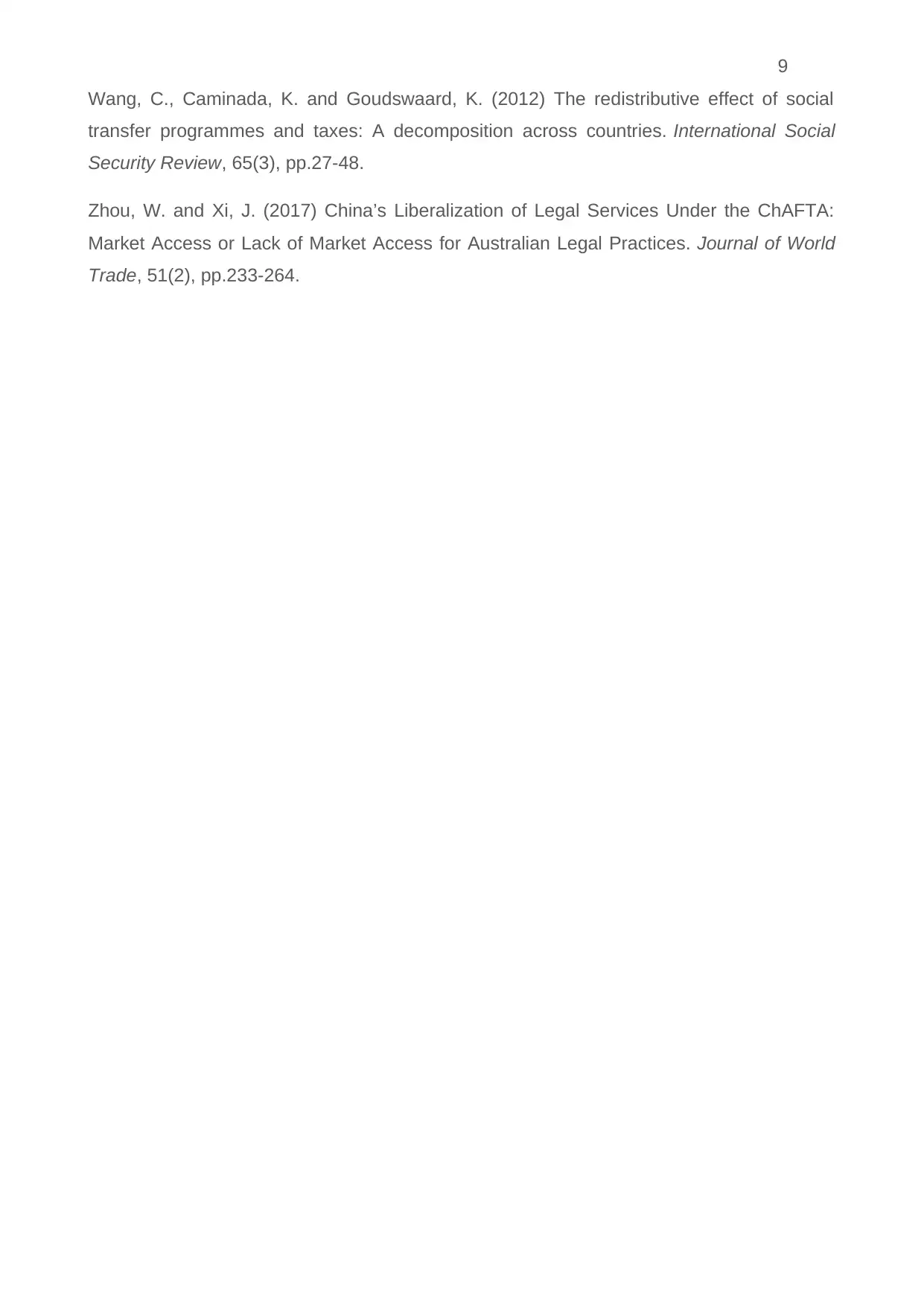
9
Wang, C., Caminada, K. and Goudswaard, K. (2012) The redistributive effect of social
transfer programmes and taxes: A decomposition across countries. International Social
Security Review, 65(3), pp.27-48.
Zhou, W. and Xi, J. (2017) China’s Liberalization of Legal Services Under the ChAFTA:
Market Access or Lack of Market Access for Australian Legal Practices. Journal of World
Trade, 51(2), pp.233-264.
Wang, C., Caminada, K. and Goudswaard, K. (2012) The redistributive effect of social
transfer programmes and taxes: A decomposition across countries. International Social
Security Review, 65(3), pp.27-48.
Zhou, W. and Xi, J. (2017) China’s Liberalization of Legal Services Under the ChAFTA:
Market Access or Lack of Market Access for Australian Legal Practices. Journal of World
Trade, 51(2), pp.233-264.
1 out of 10
Related Documents
Your All-in-One AI-Powered Toolkit for Academic Success.
+13062052269
info@desklib.com
Available 24*7 on WhatsApp / Email
![[object Object]](/_next/static/media/star-bottom.7253800d.svg)
Unlock your academic potential
Copyright © 2020–2026 A2Z Services. All Rights Reserved. Developed and managed by ZUCOL.





